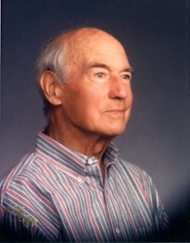
John Brian Mudd
Professor of Botany and Plant Sciences, Emeritus
Emeritus Professor J. Brian Mudd, Department of Botany and Plant Sciences UC Riverside, died of complications from kidney disease on November 8, 1998. Born on August 31, 1929 in Darlington, England the son of John Curry and Claire Kennedy (Bell) Mudd he received his early education in the small market town of Darlington in County Durham, followed by a bachelor’s degree in Natural Science from Cambridge University. Brian left the UK to do a Master’s degree in Plant Science at the University of Alberta in Edmonton, Canada (1953) and went on to receive a Doctor of Philosophy degree with R. H. Burris at the University of Wisconsin, Madison (1958) working on peroxidases. He then spent two years (1958-1960) as a post-doctoral fellow with the "father of modern plant lipid biochemistry" Paul K. Stumpf at UC Davis.
In 1961 Brian joined the faculty of the Department of Biochemistry at UC Riverside as an Assistant Professor. At Riverside, over the next 20 years, he moved through the academic ranks of Associate Professor and Professor carrying out research and teaching in the Department of Biochemistry and the Air Pollution Research Center. In 1981 he left UC to become group leader of the Plant Cell Research Institute of a private agricultural biotechnology company of ARCO, Atlantic Richfield Company (1981-86) and then Vice President of Research at the ARCO Plant Cell Research Institute (1987-1990). In 1990 Brian returned to Riverside to become the Director of the Statewide Air Pollution Research Center and Professor in the Department of Botany and Plant Sciences. In his later years Brian’s health deteriorated; he suffered from chronic kidney disease that required periodic hemodialysis and despite a failed kidney transplant he soldiered on carrying out research and administrative duties until the condition forced his retirement in 1993.
In the early 1940s southern California farmers recognized an unusual type of damage to the leaves of sugar beets and other leafy vegetables that resulted in shriveled, discolored and mottled leaves making them unattractive and unappetizing. They called upon plant scientists at UC Riverside to identify the cause. Local chemical industries were initially suspected to be the culprits. UC Riverside scientists, however, determined that the sick plant syndrome was not caused by industrial pollutants but by "secondary" air pollutants. These resulted from vehicle exhaust reacting with sunlight to form crop destroying and lung searing ozone and PAN (peroxy acetyl nitrate). To unravel the complex effects of photochemical smog on living systems required the expertise of atmospheric chemists as well as biochemists. In that effort Brian engaged in landmark research on the effects of pollutants on plant and animal membrane lipids.
In over one hundred publications, Brian and coworkers carried out research on the effects of ozone on a wide variety of organisms and enzyme systems in order to understand the mechanisms whereby photochemical smog produces its detrimental effects on living tissues. To this end he and coworkers studied the effects of ozone on the metabolic activities of E. coli, on red blood cell enzymes, on the metabolic activities of rat hepatocytes, glycophorin, glyceraldehyde 3 phosphate dehydrogenase, the acylation of glycerol-3 phosphate in mitochondria, on indole compounds, on leaf cell membranes, and on the inhibition of glycolipid synthesis. He and coworkers also explored the effect of PAN on sulfhydryls and glutathione, on photosynthetic reactions and also carried out studies on the synthesis of sulfoquinovosyldiacyl-glycerol, phosphatidyl glycerol, and linoleate. These were published in the most prestigious journals with the highest peer review standards.
Brian was the co-editor of several books: The Metabolism, Structure and Function of Plant Lipids (1987); Physiological Ecology Responses of Plants to Air Pollution (1975); Responses of Plants to Air Pollution (Physiological Ecology), 1975; and Biosynthesis and function of plant lipids, the papers of the sixth annual symposium in botany and plant physiology, 1983. Brian trained dozens of students, postdocs and visiting scientists, many of whom went on to become leaders in plant lipid biochemistry. He was generous with his time and expertise in lipid biochemistry and freely shared the use of equipment in his laboratory, notably the newly available and expensive Beckman amino acid analyzer, to advance the research of others.
Brian was an unselfish, humble, confident, thoughtful, considerate, no-nonsense individual whose quiet judgment was valued by those in agreement or in opposition. His reliable analytical and sober approach led to him being involved in many aspects of the governance of the University and involved his service on many administrative committees, most notably the search for the Dean of the College of Natural and Agricultural Sciences. He did this, as with his bench research, thoroughly and with a “think outside the box” attitude. In doing so he enriched the Riverside campus.
He was a Jane Coffin Childs Fund Fellow (1959-60) on the Board of Directors of Vector Laboratories, a Visiting Professor at Michigan State University 1978-80; member of Sigma Xi, American Chemical Society; American Society of Plant Physiologists. He was a long serving volunteer with the American Lung Association Inland Empire Chapter.
Brian is survived by his wife Monika Ittig and his son Simon, now a Professor in the School of GeoSciences at the University of Edinburgh.
Brian was an enjoyable friend, a highly respected colleague of many, and is profoundly missed. We cherish his memory with affection and respect.
Irwin W. Sherman
W. W. Thomson
Monika Ittig
